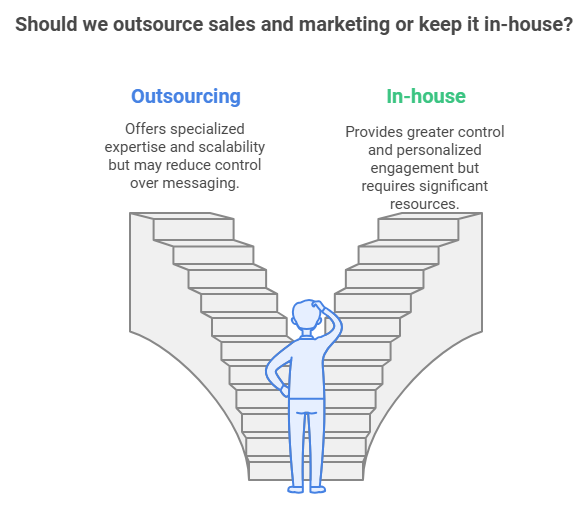
Outsourcing offers access to specialized skills and can reduce expenses. In contrast, in-house operations provide more control and closer alignment with your culture. Each approach has its strengths and limitations, which makes evaluating your priorities essential.
As technology and global markets evolve, your business needs may shift. By analyzing these options carefully, you can create a strategy that supports growth and sustainability. This comparison helps you align your operations with both short-term and long-term objectives.
Defining Outsourcing and In-House Operations
Outsourcing and in-house operations are two distinct approaches to managing business tasks. Each comes with unique benefits and limitations. Understanding these differences helps you choose the best option for your needs.
Outsourcing involves hiring external companies or professionals to handle specific tasks or functions. This approach offers access to specialized expertise and often reduces costs. However, outsourcing can limit your control over processes and outcomes. It also requires strong communication to maintain alignment with your goals.
In contrast, in-house operations rely on your internal team to manage tasks directly. This model gives you greater control and easier collaboration. Yet, in-house operations can be costly due to salaries, benefits, and infrastructure expenses. Scaling quickly may also become challenging if your team lacks the necessary skills.
The choice between outsourcing vs. in-house often depends on your business priorities. Cost, expertise, and control play significant roles in determining the best approach. Weighing the advantages and trade-offs helps you find the right balance for efficiency and growth. These insights guide your decision-making process and ensure your resources are used effectively.
Cost Comparison: Short-Term Savings vs. Long-Term Investment
When deciding between outsourcing and in-house operations, cost comparison plays a major role. Both approaches impact your budget differently over time. Short-term savings and long-term investments should be weighed carefully to make the best choice for your business.
Outsourcing often provides immediate cost savings by eliminating expenses tied to hiring and training in-house staff. External providers already have the tools and expertise needed for the job. However, hidden costs like oversight, communication challenges, or quality issues can arise. These factors may increase expenses if not managed effectively.
In-house operations, on the other hand, typically require higher upfront investment. You must account for salaries, benefits, and infrastructure costs. Over time, though, in-house teams can become more cost-effective as they gain experience and streamline workflows. Retaining control over processes may also reduce unforeseen costs.
The choice between outsourcing vs. in-house depends on your financial priorities and goals. If short-term savings are critical, outsourcing may be the right solution. For those focused on long-term value, investing in an internal team can provide stability and growth. Balancing these considerations helps you make informed decisions for your business’s future.
Scalability and Flexibility in Business Operations
Scalability and flexibility are essential for businesses navigating periods of growth or contraction. Choosing between outsourcing and in-house operations impacts how well you can adapt. Each approach offers distinct advantages depending on your business needs.
Outsourcing provides flexibility by allowing you to scale resources up or down quickly. External providers can handle sudden increases in demand without requiring long-term commitments. However, during contractions, maintaining control over outsourced processes may be challenging. Adjusting agreements or terminating contracts can introduce complexities.
In-house operations offer stability but may be less agile in responding to rapid changes. Growing your internal team requires time and resources for hiring and training. Yet, an established in-house team provides consistent quality and deep familiarity with your business. During contractions, reducing in-house staff can involve significant costs and operational disruptions.
The choice between outsourcing vs. in-house often depends on how much flexibility your business requires. Outsourcing can help you manage temporary changes, while in-house operations support long-term growth. Balancing these factors helps you align your operations with your goals and market conditions effectively.
Outsourcing Sales and Marketing
Outsourcing sales and marketing can provide access to specialized expertise and help scale your efforts quickly. External agencies often bring experience in diverse industries and markets. This approach saves time, allowing you to focus on core operations while benefiting from professional strategies.
However, outsourcing sales and marketing may reduce your direct control over messaging and brand identity. Clear communication with your provider helps ensure alignment with your goals. Regular updates and performance reviews can address concerns and maintain consistency.
In-house sales and marketing teams provide closer collaboration and deeper understanding of your brand. This approach fosters a unified strategy and personalized customer engagement. Yet, building and maintaining an in-house team requires significant time and resources, including training and salaries.
The choice between outsourcing vs. in-house sales and marketing depends on your priorities. Outsourcing offers flexibility and scalability, while in-house teams give you greater control. Evaluating your goals and resources helps you determine the best fit for your business. With a thoughtful approach, you can create a strategy that supports growth and aligns with your vision.
Control and Quality Management Considerations
Control and quality management are critical factors when deciding between outsourcing and in-house operations. Both options have strengths and trade-offs. Balancing these considerations helps you maintain high standards while achieving operational goals.
Outsourcing can challenge your ability to oversee day-to-day processes. External providers often follow their own workflows, which may differ from your expectations. However, clear contracts and regular communication help mitigate this risk. Many outsourcing firms specialize in their fields, which can lead to consistent quality if managed effectively.
In-house teams give you more direct control over processes and outcomes. Employees who work closely with your operations often better understand your quality standards. However, maintaining high quality requires ongoing training, supervision, and resource allocation. These demands can stretch your time and budget, particularly during periods of growth.
The choice between outsourcing vs. in-house depends on your priorities for control and quality. Outsourcing may suit tasks that require specialized skills but allow flexibility. In-house operations are ideal for processes where maintaining strict oversight is essential. Evaluating these factors ensures your business achieves its desired outcomes efficiently.
Industry-Specific Applications of Outsourcing vs. In-House
The decision to outsource or maintain in-house operations often depends on the nature of the industry and the specific function involved. Different industries benefit from each approach based on their unique demands and resource requirements.
In technology-driven industries, outsourcing IT services is common. External providers offer specialized skills and updated tools, which reduce costs and improve efficiency. However, industries focused on intellectual property, like software development, may favor in-house teams to maintain control over sensitive data and innovation processes. The balance between outsourcing vs. in-house often depends on whether flexibility or control is more important.
Customer service is another area where outsourcing is popular. Industries like retail and telecommunications outsource to handle large volumes of inquiries efficiently. External call centers provide cost-effective, round-the-clock support for global customers. In contrast, businesses in niche industries may prefer in-house teams for more personalized service and deeper product knowledge.
For HR functions, outsourcing is often used in payroll, benefits management, and compliance. These routine tasks require accuracy but may not need full-time staff. Companies in sectors like healthcare or finance, however, may keep HR in-house to align closely with strict regulatory requirements. The outsourcing vs. in-house debate varies based on the complexity and scale of the task.
Understanding the specific needs of your industry helps you determine the best approach. Evaluating the advantages and trade-offs ensures your resources are used effectively while maintaining quality and control.
Future Trends in Outsourcing and In-House Operations
Emerging technologies and shifting business needs are reshaping the dynamics of outsourcing and in-house operations. Advances in artificial intelligence, automation, and cloud computing are influencing how businesses manage tasks. These tools enhance efficiency and provide new opportunities to reconsider outsourcing vs. in-house strategies.
Automation is reducing the need for manual labor in repetitive tasks, making some in-house processes more cost-effective. However, it also supports outsourcing providers in delivering faster and more reliable services. For example, automated customer support systems improve response times while reducing reliance on large teams.
Remote work trends are further blurring the line between outsourcing and in-house models. Many businesses now operate hybrid teams, combining remote employees and external partners. This approach allows you to access talent from global markets without committing to full-time in-house staff.
As sustainability and social responsibility grow in importance, businesses are also reevaluating their outsourcing strategies. Choosing providers with strong environmental and ethical standards is becoming a priority. These factors influence the decision to outsource or manage operations internally, depending on alignment with corporate values.
Future trends suggest that the choice between outsourcing vs. in-house will increasingly depend on flexibility and adaptability. Leveraging technology and understanding evolving needs help you create models that balance efficiency, cost, and quality. These insights ensure your operations remain competitive and responsive to change.
Conclusion
Deciding between outsourcing and in-house operations is a strategic choice that depends on your business needs, goals, and resources. Both approaches offer unique advantages and challenges. Understanding these differences helps you align your operations with current demands while planning for the future.
Outsourcing provides flexibility, access to expertise, and cost savings, especially for specialized or scalable tasks. In contrast, in-house teams offer greater control, consistency, and alignment with your organizational values. Balancing these factors is key to optimizing your business processes.
As technology and business trends evolve, your decision-making process should adapt as well. By assessing your priorities and leveraging available tools, you can effectively manage outsourcing vs. in-house strategies. Thoughtful planning ensures your operations remain efficient, competitive, and responsive to changing market conditions.


